12 questions to know when to ignore criticism and judgement.
By Assertive Way
Key Takeaways
- You can’t stop others from judging you, but you can stop it at the door and prevent it from causing worry, rumination, and frustration.
- Random people will always have random judgements of you. Judgement reveals more about the person judging than the person being judged. So don’t let it ruin your day.
- People generally do a poor job judging others because they have limited information about you, your intention, your context and they have biases based on their beliefs, experiences, and feelings.
- Judgement always feels like a threat, but almost always isn’t.
- Not all opinion others have of you will serve you. Not all judgement of you are equal. Choose what you’ll listen to wisely. Assess who, what, and when judgement matters.
- When judgement matters, open up for dialogue, ask for their honest opinion, for specific examples, and for suggestions.
Sign up for our Weekly Newsletter “Nice With Limits” for tips and inspiration for confidence at work and to boost your career!
We take your email seriously and will never sell or share it.
Do you feel like you’re always being judged by others? Do you feel like people judge you unfairly? Does it bother you? Let me show you how to worry less about being judged.
People are terrible judges of others.
They usually have limited information. For example they don’t know you well enough, they have a limited understanding of the context around your behavior, they have a limited understanding of what’s motivating your behavior and your values, and they also have limited subject matter expertise of the matter to assess it.
On the other hand they have large biases based on their beliefs and values which can be flawed or not apply to you, based on their own limited experience, and based on emotions they may have like feeling insecure or threatened by you.
When I Learned Not All Judgement Serves You
When I was 10 years old, there was a classmate, Elvis, who led a movement to intimidate me. He went out of his way to spread rumors and even create a song about me cheating after I refused to take part in sharing answers during the exams.
I always took pride in being honest and ethical, so these fake rumors bothered me immensely. I started to avoid everyone at school. During the breaks, I’d search for the hidden or safe spots where I could be alone, but they’d manage to find me. I’d imagine responses I’d give to Elvis every day, but in real life would struggle quietly. Elvis and school thoughts haunted me.
After 3 years quietly agonizing from the judgement from Elvis and other people he influenced, he finally left the school and I never saw him again.
Until 15 years later when I had a powerful reencounter and even more powerful realization.
I travelled home for the holidays and went to visit the gym my parents were going to. I couldn’t believe it when I saw Elvis there. We chatted briefly and in a civilized manner.
In that moment I saw him, a rush of anger came back to me fueled by all the memories I had from his bullying. Then, that anger became pity. Then, I realized that in those 15 years since I had moved on and I felt incredibly proud of who I had become.
How could I allow that guy, who I never had any admiration for, to control my well-being for 3 years. In that moment, I overcame those toxic frustrations and felt an intense feeling of liberation and confidence.
In that moment I realized how it made no sense to let random people’s judgement of me ruin my happiness. Not all judgement serves you.
In that moment I realized how it made no sense to let random people’s judgement of me ruin my happiness. Not all judgement serves you.
How To Not Take Judgement Too Seriously
Judgement always feels like a threat, but most of the time it isn’t. And in the few moments where there is a real threat, you have more influence over the outcome then you think.
Not all judgement is created equal. You can’t get rid of others judgment of you, but you can police the access doors to your sanctuary.
Here are 12 questions to help you know when to not take judgment seriously.
1 Will their judgement matter 3 years from now?
If not, it’s not important in the grand scheme of your life.
2 Can their judgement cause you any real harm?
Not all judgement is going to get you fired and leave you miserable and alone. Judgement is a natural part of human interaction. If it won’t harm you, then let it go. If it may harm you, open up the dialogue by asking them what they think directly to you. That gives you the opportunity to understand the basis of the judgment and influence their perception of you.
3 Does the judgement have any significant meaning for you?
Is the judgement going to affect your goals, your dreams, your vision? If not, let it go because you have more important things to worry about.
4 Are they actually judging you?
Did they say something or is it in your imagination? Or did they make a “face”? If it’s bothering you, ask them what their opinion is. Ask for specific examples and facts.
5 Do you admire and respect them?
Are they someone that role model what they say? That live by high by high standards? If not, then don’t worry about their judgement.
6 Are they well intentioned?
Do they honestly want to help and support you? Or do they feel threatened by you? Do they want to feel good about themselves because they are insecure? If they are not well intentioned, then ignore it.
7 Are they knowledgeable enough?
Most people judgement is flawed. Do they have enough knowledge and experience to be good judges of your character and actions? If not, let it go.
8 Do they understand your perspective?
Do they have enough understanding of your situation and background? Then either let it to or give them context.
9 Do you agree with their expectation of you?
Judgement happens when what is observed is not aligned with what is expected from the other person. If that is the case, if it matters align expectations with the other.
10 Do you want feedback on that topic now?
Does their judgement serve you right now? If not, ignore it or let them know you don’t want their perspective now.
11 Is the way they are delivering judgment serving you?
Are they just saying bad things without actionable insights, then that judgement is not productive. If it matters, ask them to provide actionable feedback with examples, facts, impact, and suggestions.
12 What does someone that you actually admire and respect think of you?
One person’s opinion of you is not a fact. Get a second opinion.
Know who’s judgement matters. Know what judgement matters. Know when judgement matters. If you decide to allow judgement to enter your door, then engage in open and honest conversation with the person making the judgement. Clarify, question, and reflect. And you’ll also free yourself for any Elvis in your life.
Know who’s judgement matters. Know what judgement matters. Know when judgement matters.
Sign up for our Weekly Newsletter “Nice With Limits” for tips and inspiration for confidence at work and to boost your career!
We take your email seriously and will never sell or share it.
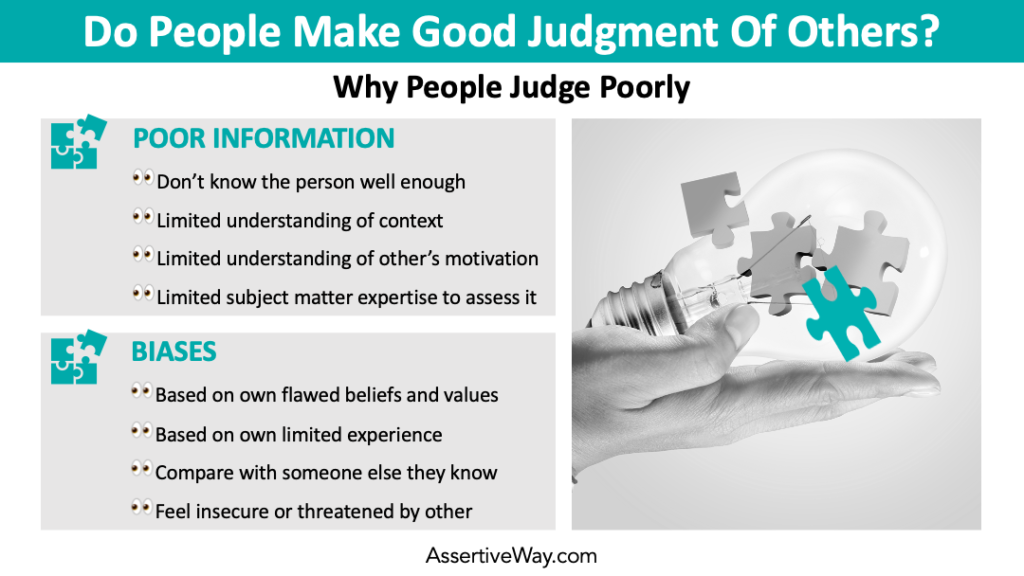
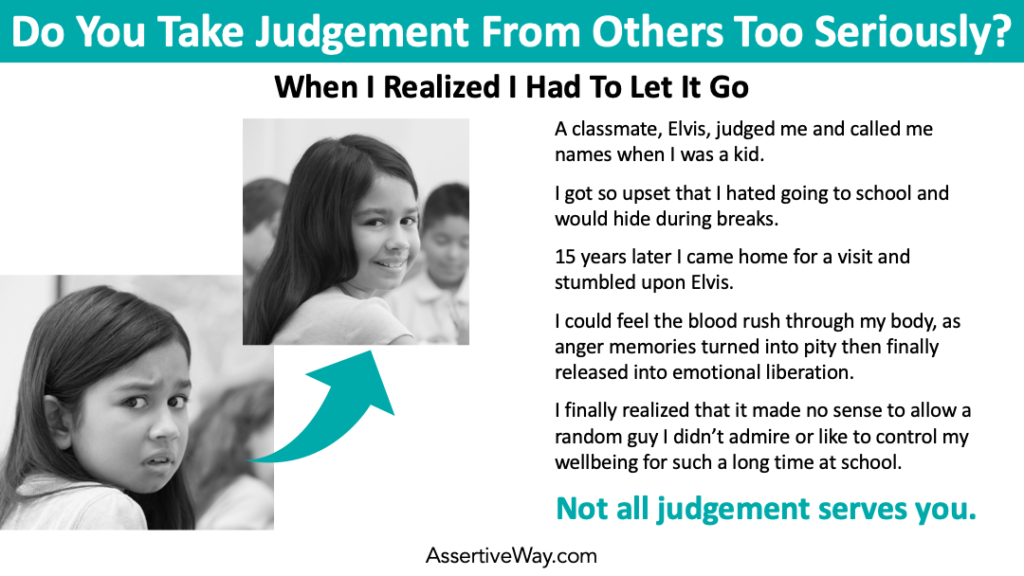
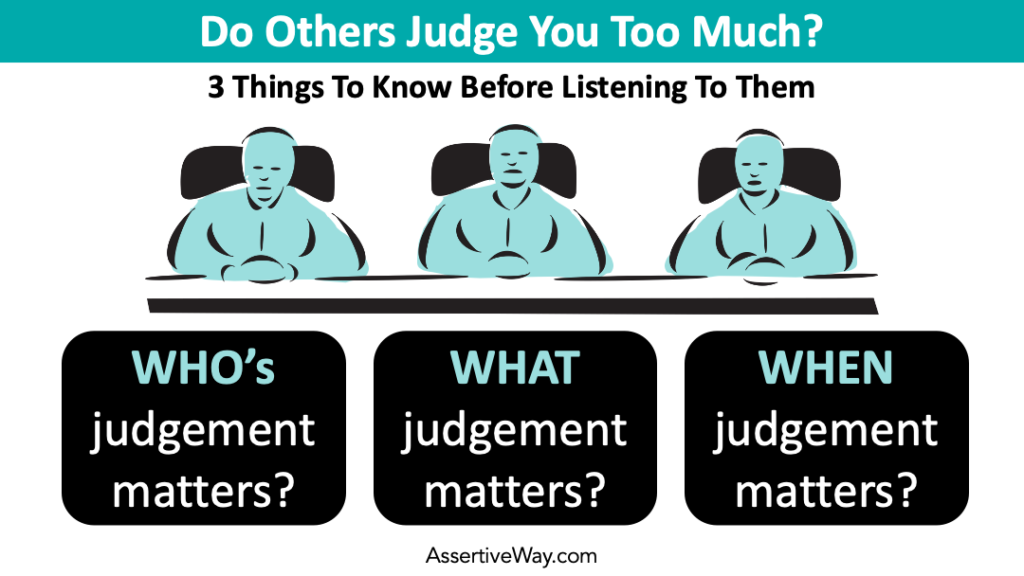
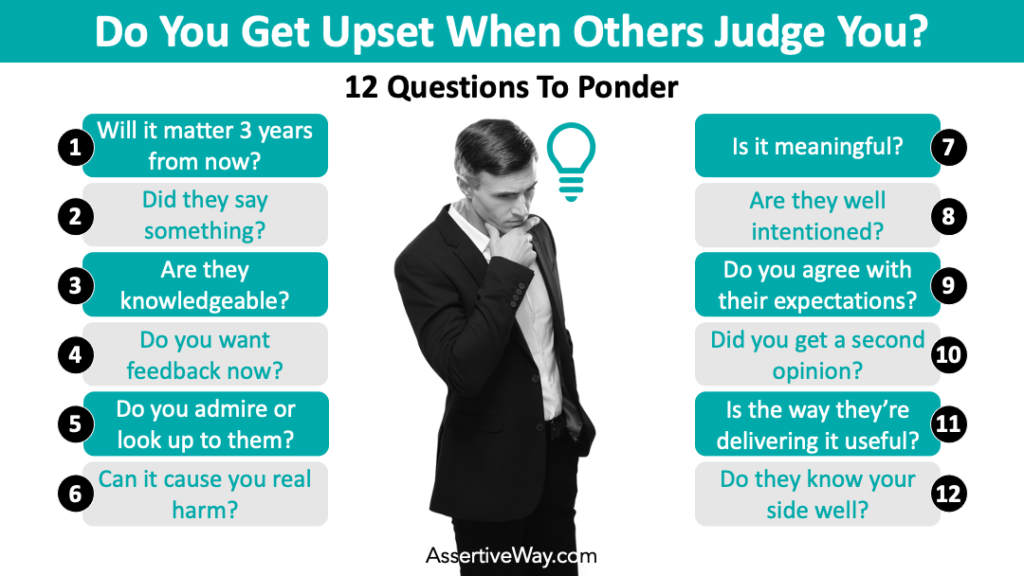
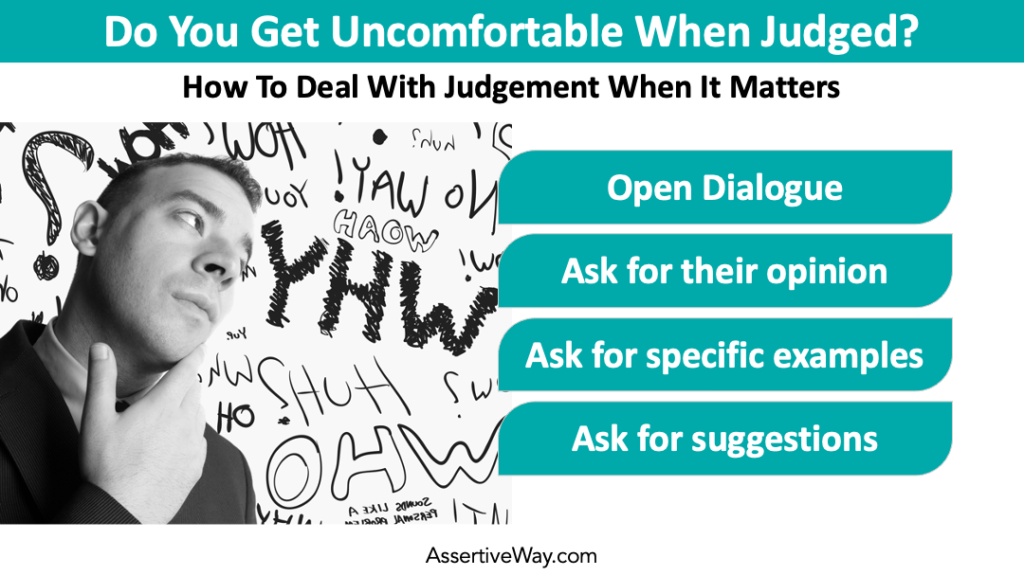
Summary
Do you always feel like you’re being judged by others? Do you feel like people judge you unfairly? Does it bother you? Let me show you how to deal with the feeling of being judged.
Not all judgement is created equal. You can’t get rid of others judgment of you, but you can police it. It’s your job to regulate the access doors to your sanctuary.
Who’s judgement are you worried about? How relevant and accurate is that judgement? How can you respond to that judgement?
Here are 12 questions to help you identify when to not take judgment seriously.
- Will their judgement matter 3 years from now?
- Can their judgement cause you any real harm?
- Does the judgement have any significant meaning for you?
- Are they actually judging you?
- Do you admire and respect them?
- Are they well intentioned?
- Are they knowledgeable enough?
- Do they understand your perspective?
- Do you agree with their expectation of you?
- Do you want feedback on that topic now?
- Is the way they are delivering judgment serving you?
- What does someone that you actually admire and respect think of you?
“People are quick to judge others faults, but never quick to point out their own.” – Unknown
Spread the assertive confidence!

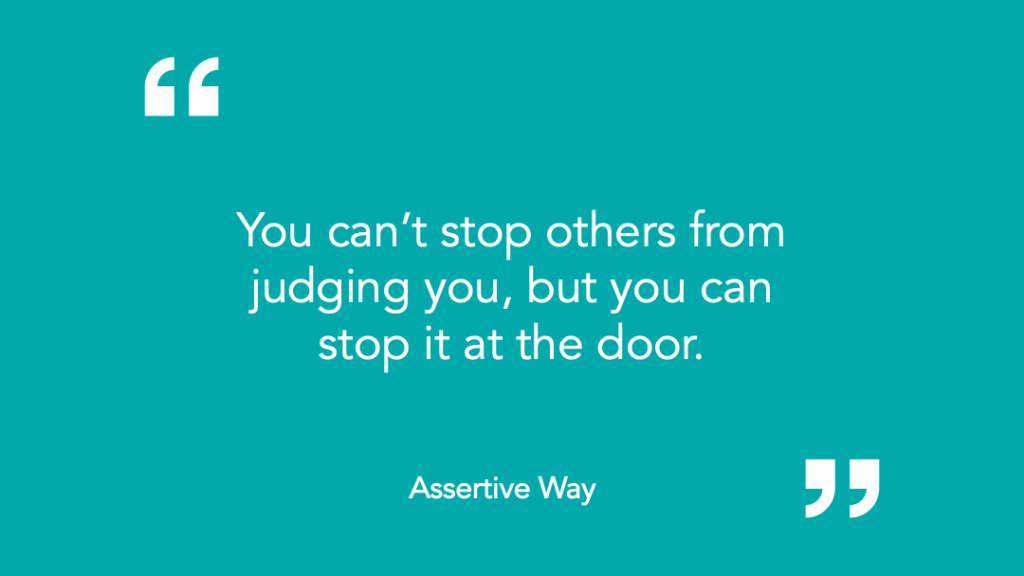
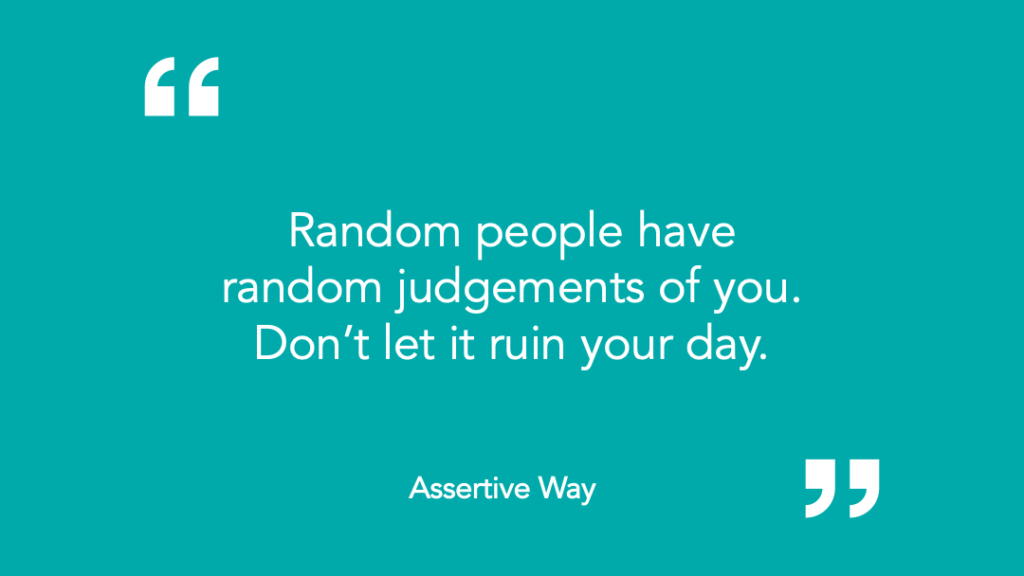
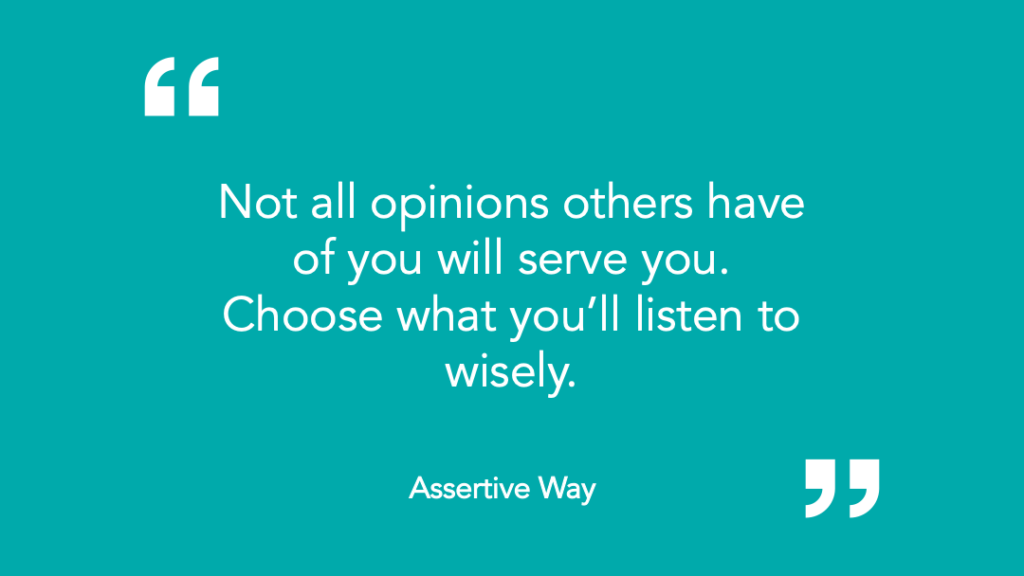
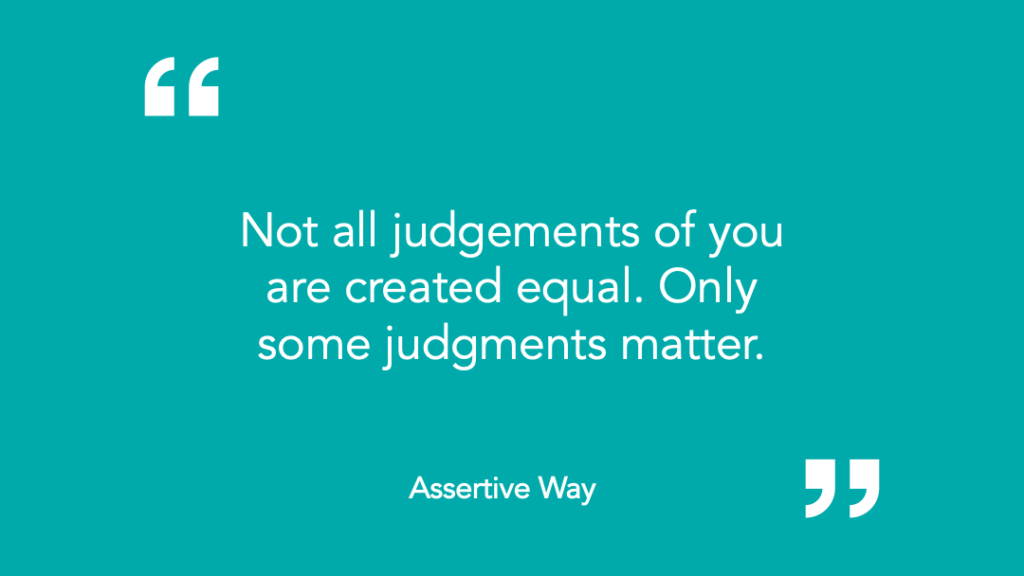
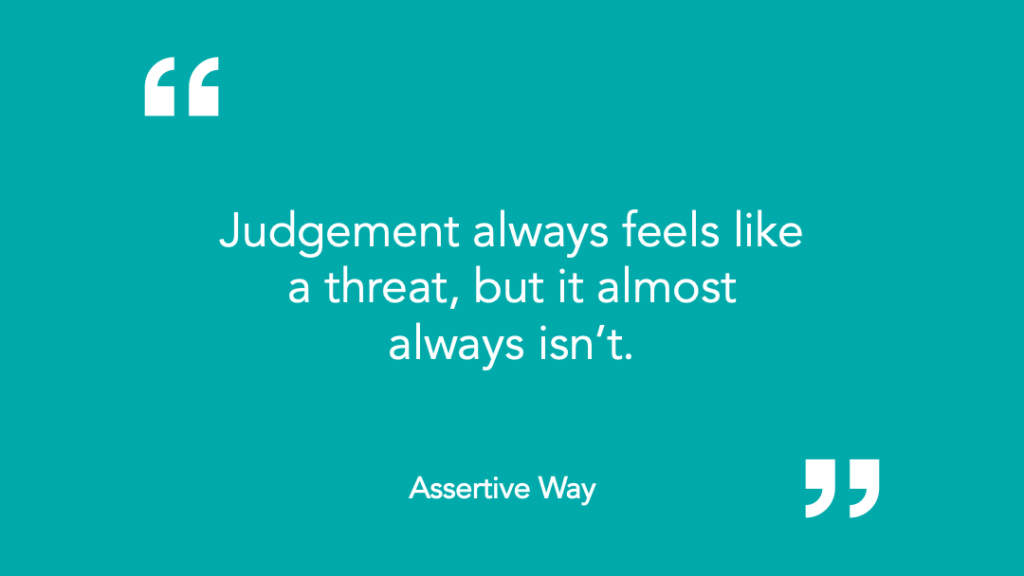

What makes you feel judged and how do you get over it?